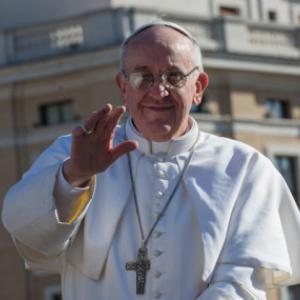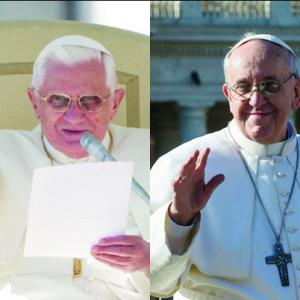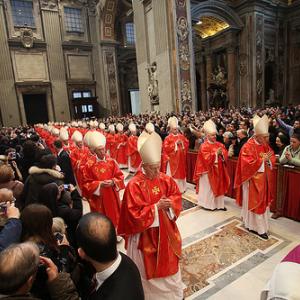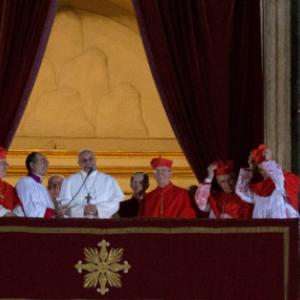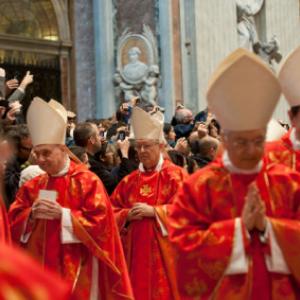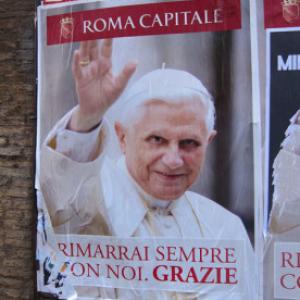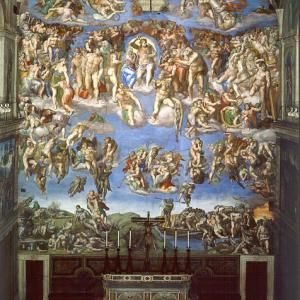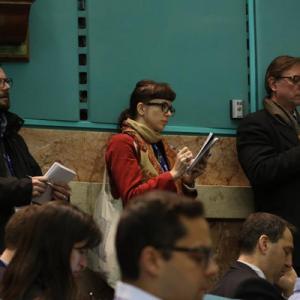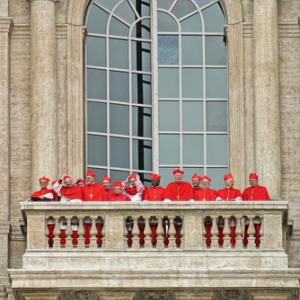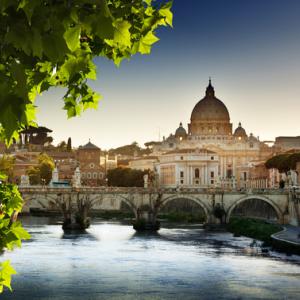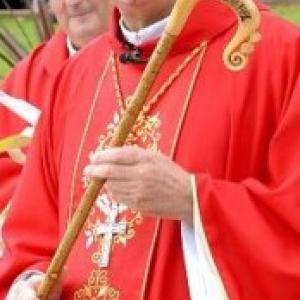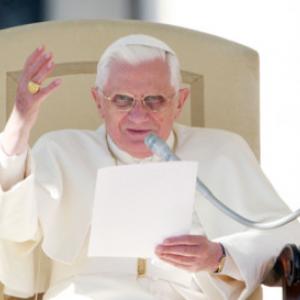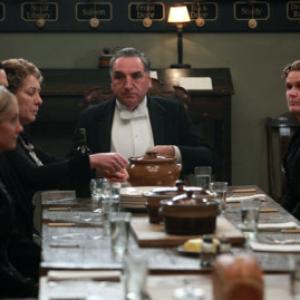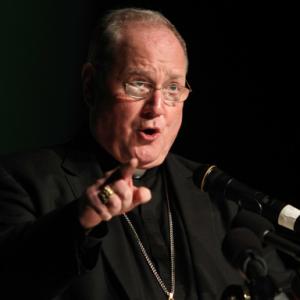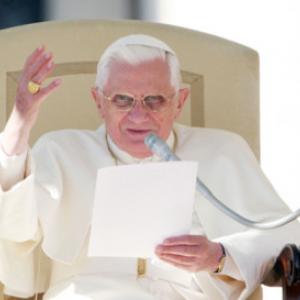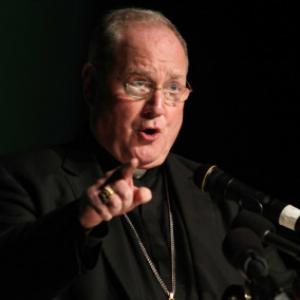David Gibson is an award-winning religion journalist, author, filmmaker, and a convert to Catholicism. He came by all those vocations by accident, or Providence, during a longer-than-expected sojourn in Rome in the 1980s.
Gibson began his journalistic career as a walk-on sports editor and columnist at The International Courier, a tiny daily in Rome serving Italy's English-language community. He then found work as a newscaster across the Tiber at Vatican Radio, an entity he sees as a cross between NPR and Armed Forces Radio for the pope. The Jesuits who ran the radio were charitable enough to hire Gibson even though he had no radio background, could not pronounce the name "Karol Wojtyla" (go ahead -- try it) and wasn't Catholic --- at the time.
When Gibson returned to the United States in 1990 he returned to print journalism to cover the religion beat in his native New Jersey for two dailies and to write for leading magazines and newspapers in the New York area. Among other journalism prizes, Gibson has won the Templeton Religion Reporter of the Year Award, the top honor for journalists covering religion in the secular press, and has twice won the top prize writing on religion from the American Academy of Religion.
Gibson currently writes for Religion News Service and until recently was covering the religion beat for AOL's Politics Daily. He blogs at Commonweal magazine, and has written two books on Catholic topics, the latest a biography of Pope Benedict XVI. He would like to write another -- but can’t seem to find the time.
He has co-written documentaries on early Christian and Jewish history for CNN, and recently worked on a March 2011 History Channel special on the Vatican. He currently has several other film projects in development. Gibson has written for leading newspapers and magazines, including The New York Times, Newsweek, The Wall Street Journal, New York magazine, Boston magazine, Fortune, Commonweal, America and, yes, The Ladies Home Journal.
Gibson is a longtime member of the Religion Newswriters Association. He and his wife and daughter live in Brooklyn.
Posts By This Author
How Long Will the Pope’s Honeymoon Last?
Since the moment of his election on March 13, Pope Francis has been warmly embraced by his own flock and even the media and the wider public in a way his bookish predecessor, Benedict XVI, was not.
Such an effusive welcome is especially good news for Catholic leaders who spent years fending off criticism of Vatican dysfunction under Benedict and a cloud of scandal and crisis at home. And the hot start for Francis is also crucial in building up a reservoir of good will that will be needed when the new pope refuses to bend on unpopular teachings or commits a gaffe of his own. Polls show that anywhere from 73 percent to 88 percent of American Catholics say they are happy with the selection of Francis, as opposed to about 60 percent who were happy with the choice of Benedict — and many of those are extremely pleased with the new pope.
When the New Pope Meets the Old Pope: Awkward?
Now that the cardinals have elected and installed their new boss, Pope Francis can get to work being the Roman Catholic pontiff, with his next order of business doing something no other pope has done in centuries: meet the guy he replaced.
Benedict’s resignation — the first by a pope in 600 years — paved the way for the conclave that elected Francis on March 13, but it also created an almost unprecedented potential for confusion and division in a church hierarchy that has room for only one pope at a time.That will happen on Saturday, when Francis is scheduled to travel a few miles outside Rome to the hilltop town of Castel Gandolfo, the summer papal residence where Benedict XVI has been staying — out of sight — since he resigned and left the Vatican on Feb. 28.
“Benedict XVI could turn into a shadow pope who has stepped down but can still exert indirect influence,” said Hans Kung, the dissident Swiss theologian and friend (as well as frequent critic) of Benedict’s since he and the former Joseph Ratzinger were up-and-coming theologians.
The Story Behind Pope Francis’ Election
Last Sunday night, the Rev. Thomas Rosica was walking through the Piazza Navona in Rome’s historic center when he bumped into Cardinal Jorge Bergoglio, who he has known for years. Bergoglio was walking alone, wearing a simple black cassock and he stopped and grabbed Rosica’s hands.
He had reason to be worried. Two days later, on Tuesday evening, he and 114 other cardinals entered the conclave to elect a successor to Benedict XVI; a little more than 24 hours and five ballots after that, Bergoglio emerged on the balcony of St. Peter’s Basilica as Pope Francis. “I want you to pray for me,” the Argentine cardinal told Rosica, a Canadian priest who was assisting as a Vatican spokesman during the papal interregnum. Rosica asked him if he was nervous. “A little bit,” Bergoglio confessed.
It was a surprising outcome, and even if Bergoglio suspected something was up, few others did, including many of the cardinals in the Sistine Chapel with him.
Bergoglio: A Pope of Paradox for a Church in Transition
VATICAN CITY — A hierarchy looking to make a clear statement about where the troubled church is headed chose on Wednesday the first member of the influential Jesuit order to be the next pope. Yet they also chose Cardinal Jorge Mario Bergoglio, a humble man who lives simply and took the name Francis (also a first) that evokes the founder of another great religious order.
The College of Cardinals picked the first non-European in modern times, as well – yet he is the son of Italian immigrants and grew up in Argentina, perhaps the most European of any country in Latin America.
And the cardinals above all wanted a pastoral figure who would project an image of vigor and warmth to the world after the eight-year reign of Pope Benedict XVI — an introverted, gaffe-prone German theologian who was 78 when he was elected and retired last month at 85, saddled by the burdens of this very public office.
Yet in his stead they chose a soft-spoken a 76-year-old who has been rapped for rarely cracking a smile — an image that Bergoglio did little to dispel with his low-key introduction as Pope Francis to the expectant crowd in St. Peter’s Square on a rainy Roman evening.
“Buona sera,” Francis said in deliberate, word perfect Italian, with just a slight Spanish accent. “You all know that the duty of the conclave was to give a bishop to Rome. It seems that my brother cardinals have come almost to the ends of the earth to get him … but here we are.”
So what, in fact, does the election of Francis say about the Catholic Church at this point in its history?
Papal Election is Anyone’s to Win … or Lose
VATICAN CITY — As 115 cardinal-electors solemnly processed into the Sistine Chapel on Tuesday afternoon, with a cry of “Extra omnes!” and the latest high-tech jamming devices cutting them off from the world, the buzz outside the Vatican over who would eventually emerge as pope grew deafening.
Everyone had theories, many had favorites, and most declared it all so unpredictable that the winner – or even how long it would take to find him – was anybody’s guess.
“We are living through an extraordinary conclave,” Marco Tosatti wrote in La Stampa, the Italian daily whose insider coverage of the pre-conclave meetings read like a tip sheet for papal bookies.
“If we look at the history of conclaves over the last century, never has there been such a range of choices, and such uncertainty over the outcome up to the moment that the doors of the Sistine Chapel closed,” he said.
In fact, the latest lines were varied and morphing all the time, a feast of permutations for Vaticanisti who parse papal elections the way sci-fi geeks deconstruct a new installment of “Star Wars.”
The ‘Tough Guy’ Option: Picking a Pope to Serve as Sheriff
VATICAN CITY — Amid all of the prognosticating about who the cardinals could choose as the next pope in the conclave that starts here on Tuesday, one reliable thread has emerged: the desire to elect a pontiff who can be a pastor to the world as well as a taskmaster to the Roman Curia.
Finding such a combination in a single man, of course, may prove difficult if not impossible, which adds to the almost unprecedented level of uncertainty surrounding this papal election.
So if anything is possible, some say it might be better to reverse the prevailing wisdom — look for a pope who will talk tough to Catholics (and the world) while shepherding the Curia with a firm hand in order to better police the wayward.
The prospect might appall progressives and others who were happy to see the end of Pope Benedict XVI’s papacy, but it has enough appeal to conservatives that they are trying to make the case.
One reason for their sense of urgency is that Cardinal Joseph Ratzinger turned out to be more of a papal pussycat as Benedict XVI than the watchdog of orthodoxy that he had been for decades while serving under John Paul II.
Is now the time for a pope who could be more of a Ratzinger than a Benedict?
Vatican: Conclave To Start on Tuesday
VATICAN CITY — The conclave to pick a new pope will begin on Tuesday the Vatican said on Friday, resolving an open question that had dogged the cardinals meeting here over the past week.
The cardinals will celebrate a special Mass “pro eligendo Romano Pontifice” — for the election of the Roman Pontiff — in St. Peter’s Basilica on Tuesday morning, and in the afternoon the cardinals will enter into the Conclave, the Vatican said.
The date was set by the cardinals gathered in a late-afternoon session on Friday. They were scheduled to vote on the decision, but there was no word on how many supported the Tuesday start date or how many preferred an earlier or a later date.
In one of his last acts before resigning on Feb. 28, Pope Benedict XVI amended the law regulating papal elections to allow cardinals to move up the beginning of the conclave, which would normally not be able to start until at least 15 days after a pope dies or leaves office.
Because Benedict resigned — the first pope to do so in 600 years — and announced his plans on Feb. 11, the cardinals did not have to focus on a funeral, as they did when John Paul II died in April 2005. They also have had nearly a month to think about a successor.
As a result, many believed the cardinals did not need to wait long after Benedict’s resignation took effect to begin the conclave itself.
Picking the Pope: Holy Spirit or ‘Groupthink’?
In Catholic theology, as in the popular imagination, the closed-door conclave to elect a new pope is supposed to be guided by the Holy Spirit.
There’s no horse-trading or lobbying, no insider deal-making or outside influences allowed. Just red-robed cardinals solemnly entering the Sistine Chapel, accompanied only by prayers and their consciences, sitting beneath Michelangelo’s fresco of the Last Judgment and discerning God’s will on who should be the next successor to St. Peter.
At least that’s the theory. The last millennium has shown that papal elections can be fraught with politics or worse, and can take months or even years of wrangling to reach a resolution.
Cardinals Move to Plug Leaks Ahead of Papal Conclave
Tensions among the Roman Catholic cardinals meeting here to choose a new pope appeared to escalate on Wednesday as the American prelates in Rome canceled their daily press briefing under pressure from colleagues who are frustrated over news coverage of their secret talks.
The cardinals also announced that they still had not been able to agree on a start date for the conclave, in which 115 electors will cast their ballots for a successor to Pope Benedict XVI.
The effort to control the flow of information from the daily pre-conclave “General Congregation” meetings marked a sharp reversal from the unprecedented openness that had characterized this first papal conclave of the digital age.
Everything You Need to Know About Popes and Conclaves
“In the church,” Chicago Cardinal Francis George once said, “everything has happened at least once!” That’s no surprise given that the Catholic Church is a nearly 2,000-year-old institution that has adapted to radically different epochs.
But electing a new pope while the former pope is still alive? That’s rare.
So what are some other firsts and lasts, quirks and facts of papal history that you should know? There are plenty, and Religion News Service has compiled a handy guide.
Venting and Vetting: The Brutal Side of Papal Politics
If you want a crash course on how papal politics really works, look no further than the saga of Scottish Cardinal Keith O’Brien.
On Friday, Britain’s most senior Catholic cleric grabbed headlines by telling the BBC that priestly celibacy was “not of divine origin” and that he’d be “happy” if priests had the option to marry.
On Saturday, O’Brien was back in the news, this time after four men reportedly accused him of “inappropriate acts” dating back to the 1980s.
By Monday, O’Brien had resigned as archbishop of Saint Andrews and Edinburgh and announced he would skip the conclave.
From champion of married priests to disgraced churchman within 72 hours, O’Brien’s trajectory is stunning but also emblematic of the frenetic and fever-pitched campaigning that occurs during the tiny window between a pope’s death or resignation and the election of his successor.
Scottish Cardinal Keith O’Brien Resigns After Sex Accusations
Cardinal Keith O’Brien of Scotland resigned on Monday in the wake of explosive charges that he had made “inappropriate” sexual advances to four men, three of them priests, and one now a former seminarian, starting in the 1980s.
O’Brien said he would skip next month’s conclave to elect a successor to Pope Benedict XVI, leaving the United Kingdom without a cardinal’s voice in the election of a new pope.
In a statement, O’Brien said Benedict had accepted his resignation effective immediately, and he appeared to allude to the events surrounding his sudden exit.
“Looking back over my years of ministry: For any good I have been able to do, I thank God. For any failures, I apologize to all whom I have offended,” said the cardinal, who turns 75 next month, which is the mandatory retirement age for bishops. Cardinals retain the right to vote in a conclave until age 80.
Conservatives Vent Disappointment Over Benedict’s Papacy
When Cardinal Joseph Ratzinger was elected Pope Benedict XVI in 2005, the surprising choice cast a pall over the liberal wing of the flock and left conservatives giddy with the prospect of total victory. Ratzinger had for decades served as the Vatican’s guardian of orthodoxy, the man known as “God’s Rottweiler,” and his vocal fans were crowing about the glorious reign to come.
“He’ll correct the lackadaisical attitudes that have been able to creep into the lives of Catholics,” the Rev. M. Price Oswalt, an Oklahoma City priest who was in St. Peter’s Square that April day, told The New York Times. “He’s going to have a German mentality of leadership: either get on the train or get off the track. He will not put up with rebellious children.”
Now, however, with Benedict set to leave office eight years later in an unprecedented departure, many on the Catholic right are counting up the ways that Benedict failed them, and wondering how their favorite watchdog turned into a papal pussycat.
Is God the Missing Character in 'Downton Abbey'?
The third season of the megahit PBS series “Downton Abbey” wraps up on Sunday, capping another must-see run of ruin and redemption at Lord Grantham’s stately English manor. Yet some are still left puzzled over the absence of what should be a leading Upstairs player in this colorful cast: God.
Writing last month in the flagship evangelical magazine Christianity Today, Todd Dorman wondered why — despite the heart-rending melodrama and all the “divine trappings” that gild the 1920s scenery — “God is a peripheral presence at best.”
“There are numerous fascinating blog posts … that search for implicit Catholic and Christian themes in the show — good and evil, suffering for cause, various types and grades of love and devotion,” Dorman wrote. “At some point, though, especially with a vicar in the family’s employ, it seems odd for such connections to remain unnamed, unspoken, and, for all we can see, unperceived.”
An American Pope?
NEW YORK — Walk the streets of Manhattan, especially around St. Patrick’s Cathedral, and ask passersby about Cardinal Timothy Dolan and two things stand out: one, they know who you’re talking about, and two, they like him. Often love him.
Both responses are unusual in the U.S. today: generally, Catholic churchmen are either interchangeable faces to the public, or, if they are known, it’s because of an unflattering headline.
Now Dolan’s extraordinary visibility and popularity are being cited as factors that could make him the first American with a realistic shot at being elected pope when the College of Cardinals gathers in March to elect a successor to Benedict XVI.
How the Traditional Pope Benedict Is Redefining the Papacy
Pope Benedict XVI came into office with the reputation of a conservative hardliner, a vigorous defender of orthodoxy who wanted to restore Tradition — yes, with a capital “T” — to a church that was seen as disturbingly undisciplined.
Yet with the stunning announcement that he is resigning as the 264th successor to Saint Peter, Benedict may wind up fundamentally changing the way the church and the world view the papacy.
That’s because the papacy has come to represent more than an office, and the pope more than just a higher-ranking priest or bishop who enjoys lifetime tenure, a nice Vatican apartment, and the privilege of wearing a white cassock no matter the season.
Instead, the papacy is seen as a divine mission unlike any other in the church, and one that ends only in death.
“Christ did not come down from the cross,” the late John Paul II, Benedict’s immediate predecessor, would tell aides who wondered if his failing health and public suffering should compel him to relinquish his office.
A man is elected pope by the cardinals, yes, but at the behest of the Holy Spirit, according to Catholic theology. He takes a new name, and can’t even go home to collect his things: He moves into the Vatican right away, inhabiting a new identity in a new position — so superior that canon law says a pope can resign, but says he cannot resign to anyone.
Who’s in the Running for Pope? 12 Names to Watch
Pope Benedict XVI’s sudden announcement that he would resign by the end of the month took the church and the world by surprise, in large part because it was a move without precedent in the modern world.
But what comes next is as old and familiar as the papacy itself: Speculating about who will succeed to the Throne of St. Peter.
Indeed, within months of Benedict’s own election in 2005, church insiders and online oddsmakers were trying to figure out who might be next, given that Benedict — now 85 — was already aging, increasingly frail, and had himself declared that he did not expect his reign to be a long one.
So what will happen when the world’s cardinals gather before the splendor of Michelangelo’s Last Judgment fresco in the Sistine Chapel to elect a new pope? Who are the “papabile,” as the Italians say, the “pope-able” cardinals?
Will the conclave make the epochal break with the European monopoly and pick a cardinal from Latin America or Africa? The Catholic Church is booming in the Southern Hemisphere, as opposed to Europe and North America, where it is on life-support or barely treading water.
Catholic Bishops Reject New Contraception Proposals
The nation’s Catholic bishops on Thursday rejected the Obama administration’s latest proposals to broaden accommodations for religious groups in regulations that require insurance companies or employers to provide free birth control coverage.
The administration last week released a long-awaited compromise for faith-based employers that have religious objections to offering health insurance that could be used by employees to access contraceptives and sterilization.
Yielding to demands by the bishops and other critics, the new accommodation contained a more expansive definition of what constitutes a religious group.
It also detailed how faith-based institutions that may not be exempt – especially religiously affiliated hospitals and universities – would be shielded from any involvement in providing contraceptive coverage; under the new rules, the insurance companies themselves would arrange that with the individual employee.
But New York Cardinal Timothy Dolan, president of the U.S. Conference of Catholic Bishops, said the proposals fail to address or ease all of the hierarchy’s concerns, and said the bishops would continue to press ahead with efforts to overturn the mandate in court.
White House Expands Religious Exemptions to Contraception Mandate
The Obama administration on Friday sought to placate religious groups by broadening religious exemptions and giving faith-based organizations more room to maneuver around its controversial contraception mandate, but the new rules offer no loopholes for privately owned businesses.
The contraception mandate, part of Obama’s health care overhaul, had set off an explosive church-state dispute and soured relations between the White House and some Christian groups, including the Catholic bishops’ conference.
The new rules, issued by the Health and Human Services Department, seek to address religious freedom concerns in two ways: First, they broaden the definition of “religious employers” so that all houses of worship and dioceses and affiliated organizations will be clearly exempt. Second, for other faith-based employers, the rules would transfer the costs and administrative tasks of the birth control insurance policies to insurance companies.
Abortion Foes Debate Best PR Approach
When thousands of abortion opponents gather Friday on the National Mall for their annual protest march, they will be united in their fierce passion for ending a procedure that the Supreme Court legalized 40 years ago in the controversial Roe v. Wade decision.
But they will also be more divided than ever on how best to rally people to join their cause: shock them with harsh slogans and graphic images of mangled fetuses, or convince them with reasonable arguments and affecting ultrasound images.
If activists are going to the March for Life “to display graphic photos or videos of aborted babies,” Simcha Fisher wrote this week in the National Catholic Register, a conservative outlet, “I’m begging you to reconsider.”
